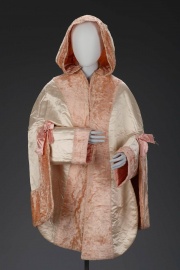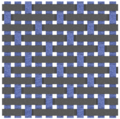Difference between revisions of "Satin weave"
| Line 2: | Line 2: | ||
== Description == | == Description == | ||
| − | A basic weave pattern that produces a shiny luster on the front and a dull face on the back of the fabric. Satin weaves are made by each weft strand floating over 3-12 warp strands then under a single strand, while at the same time the warp threads also have the long to short pattern. The floating threads highly reflect light, thus producing the characteristic satin sheen. | + | A basic weave pattern that produces a shiny luster on the front and a dull face on the back of the fabric. Satin weaves are made by each weft strand floating over 3-12 warp strands then under a single strand, while at the same time the warp threads also have the long to short pattern. The floating threads highly reflect light, thus producing the characteristic satin sheen. Additionally, this low frequency of weft/warp interruptions makes a flexible, fabric that drapes well, but also snags easily. [[Silk]], [[polyester]], and [[nylon]] fibers are commonly used with this construction to create an elegant feel in high end finished garments or cloth. This weave is commonly used for lingerie, neckties, blouses and evening gowns. Examples of satin weave fabrics are [[satin|satin]], Venetian cloth, and messaline. |
See also [[sateen%20weave|sateen weave]]. | See also [[sateen%20weave|sateen weave]]. | ||
Revision as of 13:53, 23 March 2025
Description
A basic weave pattern that produces a shiny luster on the front and a dull face on the back of the fabric. Satin weaves are made by each weft strand floating over 3-12 warp strands then under a single strand, while at the same time the warp threads also have the long to short pattern. The floating threads highly reflect light, thus producing the characteristic satin sheen. Additionally, this low frequency of weft/warp interruptions makes a flexible, fabric that drapes well, but also snags easily. Silk, Polyester, and Nylon fibers are commonly used with this construction to create an elegant feel in high end finished garments or cloth. This weave is commonly used for lingerie, neckties, blouses and evening gowns. Examples of satin weave fabrics are Satin, Venetian cloth, and messaline.
See also Sateen weave.
Additional Images
Resources and Citations
- Hoechst Celanese Corporation, Dictionary of Fiber & Textile Technology (older version called Man-made Fiber and Textile Dictionary, 1965), Hoechst Celanese Corporation, Charlotte NC, 1990
- Rosalie Rosso King, Textile Identification, Conservation, and Preservation, Noyes Publications, Park Ridge, NJ, 1985
- Edward Reich, Carlton J. Siegler, Consumer Goods: How to Know and Use Them, American Book Company, New York City, 1937
- Hermann Kuhn, Conservation and Restoration of Works of Art and Antiquities, Butterworths, London, 1986
- Art and Architecture Thesaurus Online, http://www.getty.edu/research/tools/vocabulary/aat/, J. Paul Getty Trust, Los Angeles, 2000




